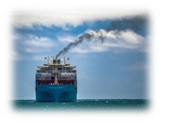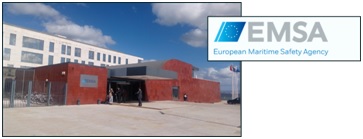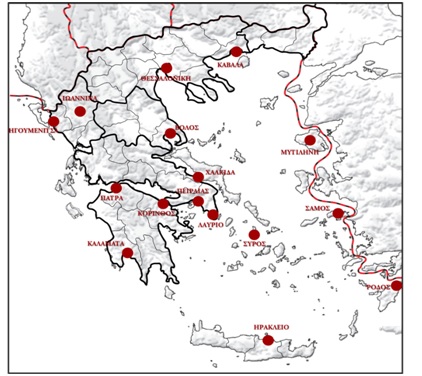BRIEF DESCRIPTION - RESPONSIBILITIES

The Directorate of Energy, Industrial and Chemical Products (DEICP) of the General Chemical State Laboratory (GCSL) has been designated as the National Competent Authority for its proper implementation European Directive (EU) 2016/802 of the European Parliament and of the Council of 11 May 2016 “regarding the reduction of the sulfur content of certain liquid fuels.”».
The purpose of this Directive is the reduction of sulfur dioxide emissions due to burning certain types of liquid fuels and, therefore, the reduction of their harmful effects on humans and the environment.
Ensuring the environmental and economic benefit resulting from the reduction of polluting emissions of ships, by implementing this directive, is a high priority for the European Union, which through the European Maritime Safety Agency EMSA monitors and coordinates the efforts of its Member States.

Greece, as a member state, submits every year to the European Commission, through DEICP, a report on the inspections carried out throughout the Territory and concerning marine fuels.
The number of mandatory ship inspections as well as marine fuel sampling results from the Article 3 of regulatory decision 2015/253/EU and is notified in our country by EMSA at the beginning of each year.
Therefore, DEICP, in collaboration with the Directorate of Navigation Safety of the Ministry of Shipping and Insular Policy, coordinates and controls a network of sulfur inspectors which consists of employees of both the GCSL as well as the Coast Guard Headquarters - Hellenic Coast Guard (CGH - HCG).
NETWORK OF SULFUR INSPECTORS THROUGHOUT THE GREEK TERRITORY

As the national competent authority, DEICP is also responsible for:
- The incorporation into national law of the aforementioned Directive and its executive decisions.
- The collection and use of the data collected in the context of this Directive’s implementation, as well as the results indicated in the examination reports of these samples by the competent accredited laboratories of the GCSL for statistical processing, in order to draw up the annual report to the European Commission.
- The submission to the European Commission, by June 30 of each year, of a report on the sulfur content of the liquid fuels that fall within the scope of this decision and which were used within the Greek territory during the previous calendar year.
- The monitoring of this Directive’s correct implementation, in cooperation with the competent services and taking measures where necessary.
- Taking care together with the Maritime Safety Directorate of the Coast Guard Headquarters-Hellenic Coast Guard, in collaboration with the European Maritime Safety Agency (EMSA) for the education and continuous training of the authorized S-inspectors.
- The authorization of trained S-inspectors with the issuance of official ID cards for all S-inspectors.
- The issuance of directives-circulars, in cooperation with the competent services of CGH-HCG, concerning the sampling method of ship fuels and the coordination of S-inspectors, as well as the provision of guidelines to the Chemical Services of the GCSL.
Other departments of the Ministry of Shipping and Insular Policy as well as the Ministry of Environment and Energy are also involved in the monitoring and proper implementation of this Directive (Maintenance of the register of licenses to trade tax-free category B1 marine fuels (https://ypen.gov.gr/wp-content/uploads/2023/12/B1-E-LICENSES-2023.12.pdf) but also the Customs Authorities (Certificate of violation against ship fuel suppliers in cases of violation of fuel marketing conditions).
In recent years, Greece has managed to successfully implement the goals set for it by the EU, carrying out numerous ship inspections as well as marine fuel sampling (Table I).
TABLE I

The details of the inspections are registered in the EU database "THETIS-EU" by the Sulfur Inspectors, with the aim of immediately recording and exchanging information, regarding the results of individual compliance checks in accordance with Directive (EU) 2016/802. This electronic system for recording and managing information of the Union, regarding controls on the sulfur content of marine fuels, was developed and operates under the responsibility of the European Maritime Safety Agency (EMSA). It provides an indication of the extent to which MS and the EU shipping industry have complied with the stricter rules and is used as a means of assessing the effectiveness of enforcement measures applied by EU MS.
Our country uses the EU database "THETIS-EU" to record all the results of the inspections carried out in the Greek Territory. It is worth noting that all fuel samples taken during said inspections are analyzed in the accredited fuel laboratories of the GCSL in Piraeus and Thessaloniki.
The percentage of samples that are outside the permitted limits in sulfur content, resulting in the imposition of sanctions by the local competent Port Authorities, ranges from 2-5%. The low percentage indicates the compliance of ships and shipowners with the requirements of the European Directive (EU) 2016/802.

For more information on legislation, circulars etc, click here.

